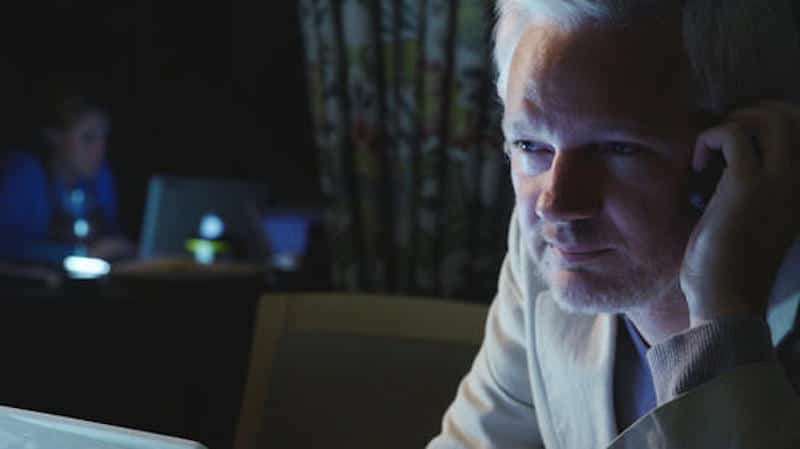
Documentary filmmaker Laura Poitras’ riveting new feature, Risk, could not be more timely.
Quite literally, on Friday when the film opened in Los Angeles, the French presidential election was thrown into jeopardy by a huge hacking campaign, perhaps by some of the same Dark Internet forces explored in her film.
The film, as the director tells in voiceovers that punctuate the action, began six years ago as a biopic of Wikileaks founder Julian Assange.
She is given unprecedented access to the enigmatic and normally secretive figure. Why? We’re not told. But it could it be through her romantic relationship with Assange’s collaborator and sometimes Wikileaks spokesperson Jacob Appelbaum? More on this later.
As depicted in her film, Assange is a bundle of nerves, all fidgety and constantly editing himself as he speaks to the camera, as if he were on trial.
Perhaps it was practice for the real-life trial he was facing four years ago as the British Supreme Court decided whether to allow Assange’s extradition from the UK to Sweden to face charges of sexual misconduct by two women there.
Soon, however, Poitras realizes that she cannot ignore this 800-pound gorilla in the room, and the film evolves into an exploration of Assange’s sexual misconduct charges and on a larger scale, the misogynistic attitude that some would say pervades the hacker world.
Right on cue, we see her footage of Assange talking to his women lawyers in advance of the trial about how they should frame his defense. As the lawyers becoming increasingly uncomfortable, he outlines a case of how the accusers are part of a radical-lesbian-feminist plot against him.
Poitras’s style is not so much to explain issues raised in the film — including Assange’s role as a Russian “cut out” (middleman) during the 2016 U.S. Presidential election, but to offer that there is no one truth. Everything is relative.
Who’s to say what’s fake news or not, when sexual abuse is real or conspiratorial, or whether Assange is a selfless figure who’s devoted his life to his political beliefs or an egomaniac who’s willingly a dupe of the Russian authoritarian regime as along as the spotlight remains on him.
In my coverage last month of the 2017 Tribeca Film Festival, I pointed out an emerging trend in which filmmakers insert themselves as characters into the reality of the film, in movies such as Flames, My Art and Rock N Roll.
Of course, Michael Moore has been doing this for years but he plays it for comedic affect, with himself as the puckish master of ceremonies.
Poitras, on the other hand, is an active and, one could argue, important player in the world she documents.
Earlier, I mentioned her personal relationship with Assange confidante Jacob Appelbaum. As revealed in the film, he, too, was accused of sexual misconduct by one of Poitras’ close friends.
And, needless to say, Poitras along with creative and business partner Glenn Greenwald were the conduits for bringing Edward Snowden’s story to the world.
During the post-screening Q&A, Poitras was interviewed by filmmaker Ava DuVernay.
Like the rest of the audience, Duvernay appeared perplexed by the many unanswered questions the film raises. (Interestingly, during the Q&A the audience was not allowed to pose questions to Poitras.)
As fidgety as Assange was in her film, Poitras danced around questions raised. She admires Assange but doesn’t trust him. Why not?
She believes Wikileaks does heroic work but doesn’t agree with everything they do. Was that a reference to what some would characterize as Wikileaks’ broadsided attack on Hillary Clinton and her presidential campaign?
And what about Assange’s accusers? If Poitras’ film is now about misogyny in the hacker community, why didn’t she make any attempt to contact Assange’s or Appelbaum’s alleged victims? Don’t they deserve the chance to tell their side of the story?
The world that Poitras paints of hacker activists is rumpled and messy, filled with strange bedfellows, and like it or not, she’s part of it.
If you’re looking for definitive conclusions about Assange or his cohorts, especially as to their motivations in influencing the U.S. and now possibly the French presidential elections, you won’t find them in her film.
Poitras, like the rest of us, is trying to see through the fog of the digital wars. It makes for a frustrating but fascinating experience.